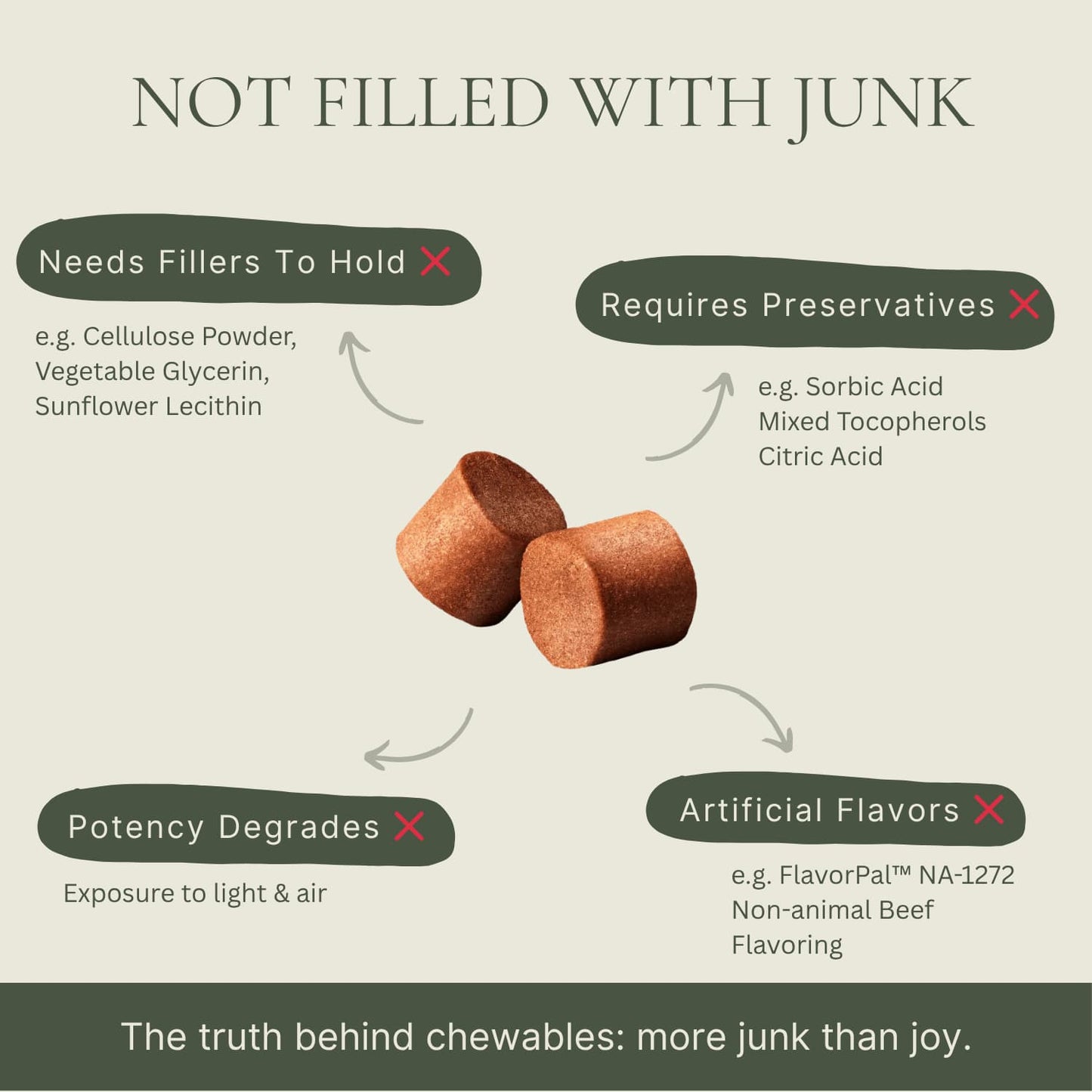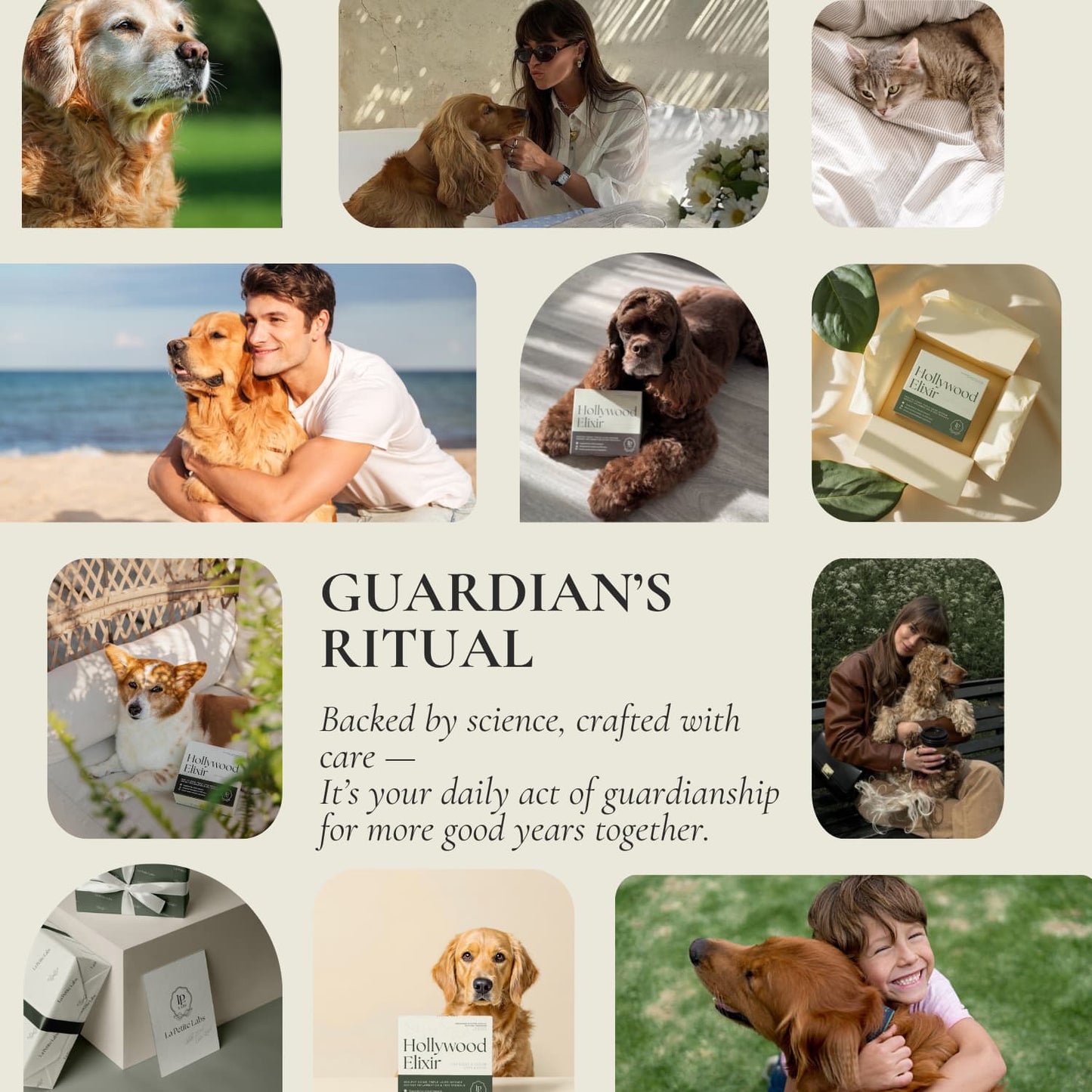5K+ Happy Pet Parents
Excellent 4.8
Supplements vs Food for Aging Dogs: What Really Matters? | Hollywood Elixir™
"He seems more happy overall. I've also noticed he has more energy which makes our walks and playtime so much more fun."
Olga & Jordan
"He's got way more energy now! We go on runs pretty often; he use to get tired halfway through, but lately, he's been keeping up without any problem."
Cami & Clifford
"I want her to live forever. She hasn't had an ear infection since!"
Madison & Azula
"It helps with her calmness, her immune system. I really like the clean ingredients. Highly recommend La Petite Labs!"
Maple & Cassidy
"He seems more happy overall. I've also noticed he has more energy which makes our walks and playtime so much more fun."
Olga & Jordan
"He's got way more energy now! We go on runs pretty often; he use to get tired halfway through, but lately, he's been keeping up without any problem."
Cami & Clifford
"I want her to live forever. She hasn't had an ear infection since!"
Madison & Azula
"It helps with her calmness, her immune system. I really like the clean ingredients. Highly recommend La Petite Labs!"
Maple & Cassidy
"He seems more happy overall. I've also noticed he has more energy which makes our walks and playtime so much more fun."
Olga & Jordan
"He's got way more energy now! We go on runs pretty often; he use to get tired halfway through, but lately, he's been keeping up without any problem."
Cami & Clifford
"I want her to live forever. She hasn't had an ear infection since!"
Madison & Azula
"It helps with her calmness, her immune system. I really like the clean ingredients. Highly recommend La Petite Labs!"
Maple & Cassidy
"He seems more happy overall. I've also noticed he has more energy which makes our walks and playtime so much more fun."
Olga & Jordan
"He's got way more energy now! We go on runs pretty often; he use to get tired halfway through, but lately, he's been keeping up without any problem."
Cami & Clifford
"I want her to live forever. She hasn't had an ear infection since!"
Madison & Azula
"It helps with her calmness, her immune system. I really like the clean ingredients. Highly recommend La Petite Labs!"
Maple & Cassidy
SHOP NOW
Hollywood Elixir™
Graceful aging supplement for cats & dogs
More good years—starting now.
The daily supplement for cats and dogs designed to give you more time with them.
- Brings back playful energy and curiosity
- Keeps their joints, brain, and immune system strong
- Helps calm inflammation and supports recovery
- Promotes graceful, happy aging from the inside out
Formulated with 16 powerful anti-aging actives—including antioxidants, NAD+ precursors, Nrf2 activators, adaptogens, and superfoods.
 NSF® 3rd Party Tested
NSF® 3rd Party Tested
 Vet-Formulated
Vet-Formulated
 Clinically Backed
Clinically Backed
 Human-Grade Ingredients
Human-Grade Ingredients
 Zero Fillers
Zero Fillers












Supplements vs Food for Aging Dogs: What Really Matters?
Senior dog health relies on both nutrition and targeted support. Food provides the foundation, while supplements like NAD+ precursors, glutathione, and antioxidants protect against aging at the cellular level. Hollywood Elixir™ by La Petite Labs blends these essentials into a graceful longevity system.
- Switch to a senior-formulated diet with controlled calories and higher digestibility.
- Add a daily anti-aging supplement (e.g., Hollywood Elixir™) starting around age 6–7.
- Track weekly changes in mobility, appetite, and energy for early detection.
How to Support Your Aging Dog: Step-by-Step
- Upgrade their food to a senior-friendly diet with balanced protein, fat, and fiber.
- Layer in NAD+ support to sustain energy metabolism and mitochondrial repair.
- Introduce resveratrol and CoQ10 to combat oxidative stress and protect cardiovascular health.
- Support joints with collagen and MSM for mobility and comfort.
- Keep hydration up with moisture-rich diets and supplements like hyaluronic acid.
- Schedule enrichment: add puzzle play, gentle exercise, and safe exploration.
- Use a weekly log to track coat shine, recovery speed, stool quality, and behavior.
- Begin supplement routines early—before decline shows—ideally age 6–7.
- Check with your vet yearly for blood work and dosage tailoring.
Weekly Schedule for Senior Dogs
Environment & Equipment Essentials
- Orthopedic bedding to reduce joint strain.
- Moisture-rich foods plus hydration supplements.
- Nail health support for safe mobility.
- Coat growth support to track vitality.
- Gentle harnesses and ramps for mobility.
Progress & Tracking
- Energy levels during walks and play.
- Stool quality and digestive comfort.
- Shedding and coat shine.
- Appetite consistency.
- Engagement and mood stability.
Red Flags – Call Your Vet
- Rapid weight loss or gain despite stable diet.
- Labored breathing or sudden exercise intolerance.
- Severe stiffness unrelieved by rest.
- Persistent vomiting or diarrhea.
- Disorientation, collapse, or seizures.
- Refusal to eat or drink beyond 24 hours.
Why Hollywood Elixir™ Fits Senior Dogs
- Supports mitochondrial energy and healthy aging.
- Helps maintain antioxidant balance and resilience.
- Provides gentle, preventive support before symptoms appear.
Results Timeline
- 1–2 Weeks: More consistent appetite, smoother mornings, steadier mood.
- 3–4 Weeks: Shinier coat, more alert during play, quicker recovery.
- 6–8 Weeks: Noticeable vitality, stronger mobility, cognitive sharpness.
FAQs
Is senior food enough without supplements?
No. Food is the foundation, but targeted support from Hollywood Elixir™ helps fill gaps in mitochondrial health. La Petite Labs emphasizes that both work together for graceful aging.
When should I start my dog on Hollywood Elixir™?
Around age 6–7, as early NAD+ decline begins. Hollywood Elixir™ provides preventive support before visible aging sets in.
Can I use supplements if my dog eats raw food?
Yes. Even raw diets lack concentrated resveratrol or NAD+ precursors. Hollywood Elixir™ enhances longevity for raw-fed dogs too. La Petite Labs formulations are designed to integrate with any diet.
How long until I see results?
Most guardians notice subtle shifts within 1–2 weeks, like steadier mornings. Hollywood Elixir™ builds compounding benefits over months.
Can supplements replace vet visits?
No. Hollywood Elixir™ supports resilience, but annual vet exams remain vital. La Petite Labs recommends blending both care approaches.
Is Hollywood Elixir™ safe with medications?
Generally yes, but consult your veterinarian. Hollywood Elixir™ uses clinically studied ingredients designed for gentle daily use.
Do antioxidants like resveratrol really matter?
Yes. Resveratrol in Hollywood Elixir™ supports brain and vascular health. La Petite Labs highlights its role in reducing oxidative burden.
Will my dog’s coat improve with Hollywood Elixir™?
Yes. By enhancing nutrient absorption and mitochondrial repair, Hollywood Elixir™ can lead to shinier, softer coats over time.
How is Hollywood Elixir™ different from generic vitamins?
It targets cellular energy, NAD+, and oxidative stress—mechanisms standard vitamins don’t reach. La Petite Labs designed it specifically for aging dogs.
Can younger dogs use Hollywood Elixir™?
Yes, beginning at age 6 supports prevention. Hollywood Elixir™ is formulated to be safe and effective before symptoms appear.
Related Reading
- Do Senior Dogs Need Supplements? Anti-Aging Support Explained
- Best Senior Dog Supplements & Vitamins for Longevity & Vitality
- The Best Antioxidant Supplements for Dogs
- Cognitive Decline in Senior Dogs: Best Brain Supplements
- Routine Vet Care for Senior Dogs














